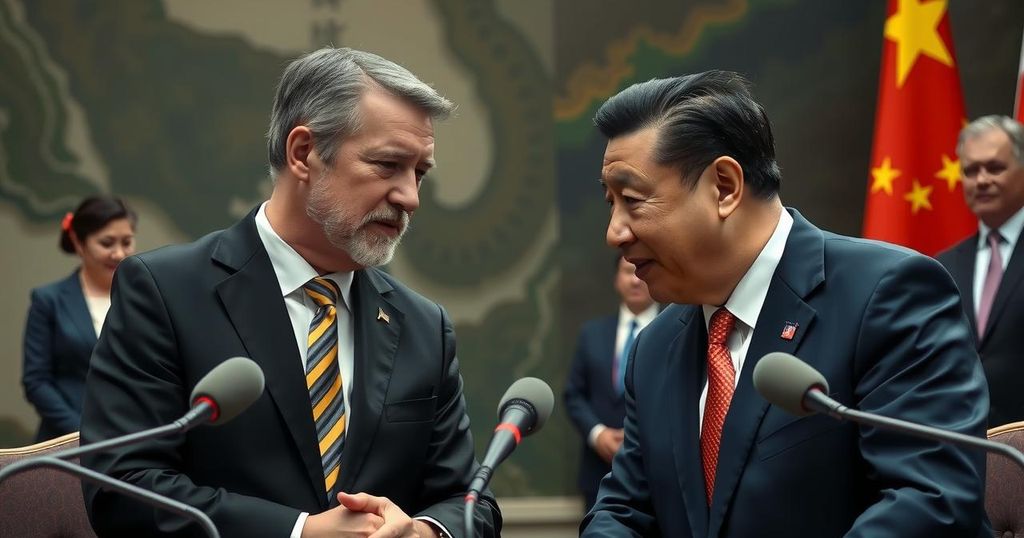Keir Starmer to Engage with Xi Jinping at G20 Summit Amid Global Tensions

Sir Keir Starmer will meet with Chinese President Xi Jinping at the G20 summit, focusing on ‘stable and pragmatic engagement.’ He aims to reinforce support for Ukraine amidst ongoing conflict while advocating for cooperation on international stability, climate change, and economic growth, all aligned with the UK’s national interests. This marks the first in-person meeting between a UK prime minister and President Xi since 2018.
Sir Keir Starmer is scheduled to engage with Chinese President Xi Jinping at the G20 summit this week. The UK government emphasizes the objective of establishing “stable and pragmatic engagement” with China, focusing on areas such as international stability, climate change, and economic growth. However, Downing Street insists on the importance of candid discussions regarding remaining areas of disagreement, ensuring that all engagements align with the UK’s national interests. On route to the summit in Rio de Janeiro, Sir Keir expressed that reinforcing support for Ukraine remains a priority amidst escalating missile and drone strikes from Russia, closer to the conflict’s 1,000th day. This summit arrives as reports indicate that the United States has approved the provision of long-range missiles to Ukraine for potential strikes against Russia, a significant development given prior hesitations among Western nations. During the summit, Prime Minister Starmer is anticipated to urge G20 partners to augment their support for Ukraine, cautioning against the dire consequences of allowing Russia to gain the upper hand. This forthcoming meeting between Starmer and Xi represents the first face-to-face encounter between a UK prime minister and the Chinese leader since 2018, although they previously communicated over the phone in August following Labour’s electoral victory. The UK government has previously criticized China for its military allegiance to Russia amidst the ongoing conflict, emphasizing that global engagement is crucial to safeguarding national interests. Foreign Secretary David Lammy recently conducted discussions with high-level Chinese officials, continuing the dialogue started under Theresa May, who envisioned a “golden era” for UK-China relations during her last visit. In contrast, recent leaders have voiced concerns about China, with former Prime Minister Rishi Sunak deeming it the “biggest state-based threat to our economic security.” Nevertheless, like the current government, he acknowledged the importance of collaboration with China on global issues such as climate change. The G20, comprising major global economies and various international organizations, convenes in Brazil to facilitate discussions aimed at fostering partnerships for economic growth, security, and climate transition, alongside support for developing nations.
The G20 summit gathers the world’s largest economies to address pressing global issues, varying from economic policies to international security. Notably, this summit occurs amidst heightened geopolitical tensions, especially concerning the Russia-Ukraine conflict and the role of China in global affairs. The UK government’s aim at the summit is to balance engagement with China, promoting mutual interests while addressing significant human rights concerns and security issues. With the ongoing conflict leading to intense discussions about military support for Ukraine, the dynamics between China, the UK, and their allies play a critical role in shaping international policies and responses. Historical context, particularly the relative cooling of UK-China relationships due to issues such as human rights violations, contrasts with the current diplomatic approach that favors engagement over estrangement.
In conclusion, the upcoming meeting between Sir Keir Starmer and President Xi Jinping at the G20 summit marks a significant moment for UK-China relations, highlighting both the necessity of dialogue and the complexities involved in addressing divergent interests. With pressing issues such as the Ukraine conflict and climate change at the forefront, the UK government seeks to maintain a pragmatic and stable approach, fostering development while safeguarding national interests. The summit aims to galvanize support among global economies for concerted action on pivotal challenges affecting international peace and cooperation.
Original Source: www.bbc.com








